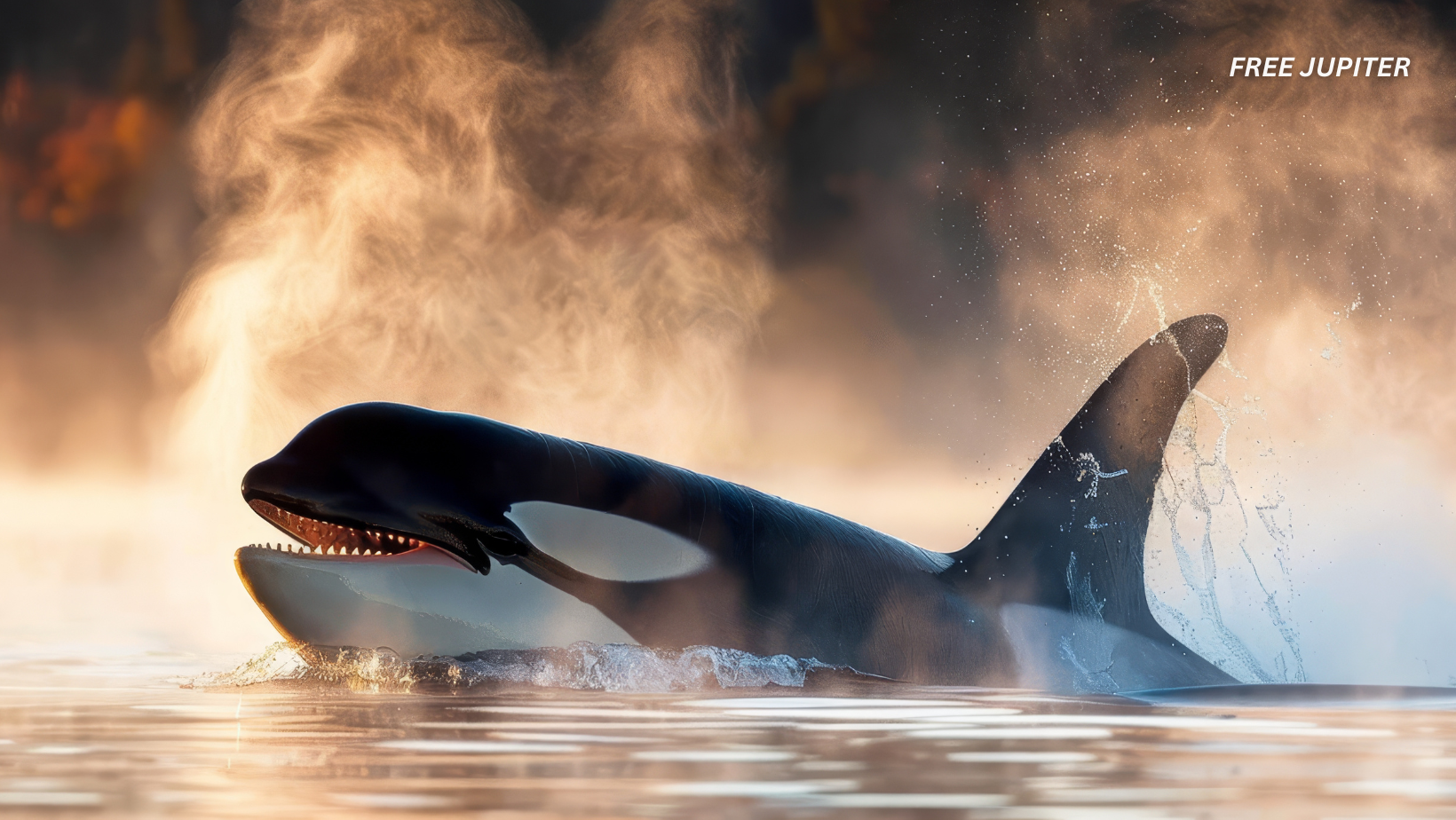Friendly Note: FreeJupiter.com shares general info for curious minds 🌟 Please fact-check all claims—and always check health matters with a professional 💙
Killer whales—or orcas, if we’re being polite—have always fascinated scientists and ocean lovers alike. With their striking black-and-white coats, high-pitched calls, and tight family units, orcas are some of the most captivating animals in the sea. But lately, they’ve been making headlines for something a little more… intense.
Let’s just say these whales have been leveling up.
Not Just Pretty Faces: Orcas Are Ocean Strategists
It turns out orcas aren’t just cruising the seas looking majestic. They’re learning, adapting, and teaching one another new skills at a speed that has researchers doing double takes. Recent reports from marine biologists and sailors point to an increasing number of orcas engaging in behaviors that are… well, surprisingly strategic.
In some parts of the world, pods of orcas have been seen coordinating attacks on blue whales—yes, blue whales, the largest animals on Earth. These aren’t random scuffles. The orcas appear to be working together like a synchronized team, dividing roles and going in for the kill with shocking efficiency.
It’s like watching a National Geographic version of a tactical special ops unit—but underwater, and involving 8,000-pound mammals.
Adapting to a Changing Planet
As if coordinated whale hunts weren’t enough, orcas are also reshaping their behavior to keep up with the fast-changing environment. In the Southern Ocean near Antarctica, the ice is melting due to climate change, and that’s shifting where prey can be found. Some species that orcas typically rely on are migrating, disappearing, or harder to catch. But orcas aren’t backing down—they’re adapting.
They’ve been observed adjusting their hunting techniques in response to thinner ice and altered migration patterns. Some have even started targeting entirely new prey, such as seals resting on smaller ice floes, or fish found in unfamiliar waters. The speed at which they learn and adapt makes them stand out among marine mammals.
Stealing from Humans? Yes, and They’re Getting Good at It
Orcas are also becoming rather clever when it comes to fishing boats. In regions like the North Pacific, pods have figured out how to steal fish directly from commercial fishing lines—without getting caught in the process.
Some orcas trail fishing vessels for miles, waiting for the perfect moment to snatch halibut or black cod off the hooks. This isn’t just random opportunism. They’ve learned to recognize engine noises, memorize boat routes, and even adapt their behavior to avoid detection. It’s like the ocean version of a highly organized heist.
And here’s the jaw-dropping part: these fishing raids are spreading between pods. When one group figures out a trick, neighboring orcas pick it up fast. It’s marine mentorship in action.
Read more: Humpback Whales Are Trying To Send Messages To Humans: How They Are Communicating With Us
Cultural Creatures of the Deep
Scientists believe orcas exhibit a form of culture—a concept that was once thought to be unique to humans and maybe a few apes. In this context, “culture” refers to behavior that is passed down socially, rather than genetically.
Orcas live in tight-knit family groups (called pods), and these pods have been observed teaching their young how to hunt, navigate, and even “play” with other marine animals. In one case, orcas were seen repeatedly tossing porpoises in the air—not to eat them, but seemingly for sport or social bonding.
Though that may sound unsettling, it’s a prime example of their cognitive complexity. They’re curious, observant, and seem to enjoy activities beyond survival.
Read more: Marine Animal Shows Are Officially Banned in Mexico After Historic Legislative Vote
Are Orcas Really Getting Smarter?
Here’s the thing: their brains haven’t gotten bigger. Orcas haven’t suddenly evolved in the traditional sense. But what they do have is a huge capacity for social learning. Their brains are already wired for memory, emotion, and communication—three key ingredients for building intelligence that’s flexible, not just instinctual.
They’re not inventing tools or launching space programs, but they are solving problems and adapting to human disturbances with shocking sophistication. The behaviors they’re learning aren’t just impressive—they’re sometimes unsettling. Because they suggest a level of awareness we don’t often expect from animals in the wild.
So, Should We Be Worried?
Let’s get this out of the way: orcas aren’t turning on humanity. There’s no evidence to suggest they’re plotting against us or preparing for a marine uprising. But they are reacting to the pressures we’ve placed on their world—pressures like overfishing, pollution, climate change, and noisy boat traffic.
In some ways, orcas are simply responding to survival challenges the way any intelligent species would: by getting creative.
That creativity just happens to involve outsmarting fishing crews, experimenting with new hunting techniques, and teaching those behaviors to their podmates.
The Big Picture: A Glimpse Into Ocean Intelligence
What we’re witnessing may be more than just quirky animal behavior. It’s a window into what adaptive intelligence looks like in a world where the rules are changing fast. Orcas are doing what humans have done for millennia: sharing knowledge, adjusting to their environment, and building on what works.
And they’re doing it without smartphones, speech, or written language—just brainpower, teamwork, and an incredible memory.
The ocean is a vast, mysterious place. And floating in its depths are creatures with minds sharper than we ever imagined. Orcas are a reminder that intelligence isn’t a human monopoly—and that the line between “animal” and “thinker” might be thinner than we thought.
The Orca That Said “Hello”: How a Whale Learned to Talk Like Us
We usually think of parrots when it comes to animals mimicking human speech. But one very special orca made headlines when she proved she could do it too—sort of.
In 2018, scientists at Marineland Aquarium in France worked with an orca named Wikie, a highly intelligent female living in captivity. Using a combination of hand gestures and vocal cues, the researchers taught Wikie to mimic several human words and sounds. What happened next left them stunned.
Wikie successfully repeated words like “hello,” “bye-bye,” and even managed to count to three using distinct vocalizations that weren’t typical orca sounds. She also mimicked a raspberry noise (that playful ppppftt sound humans make with their lips), and even copied the name of her trainer—Amy.
The sounds weren’t flawless—after all, orcas don’t have lips, teeth, or vocal cords quite like ours. But the imitations were surprisingly close, enough for human listeners to recognize what she was trying to say. And she did it all using her blowhole, which orcas use to produce their complex range of clicks, whistles, and pulsed calls.
Read more: If You Kill One Dragonfly, You Are Responsible For Over 100 Mosquito Bites
Why This Matters: More Than Just a Party Trick
Wikie wasn’t just showing off. Her ability to imitate unfamiliar sounds from an entirely different species suggests a high level of cognitive flexibility—a mental trait linked to advanced learning, problem-solving, and memory.
This type of vocal mimicry is rare in the animal kingdom and has only been seen in a few species, including dolphins, parrots, elephants, and some songbirds. The fact that an orca could do it too points to deep layers of intelligence beneath those sleek black-and-white exteriors.
But there’s more. Orcas in the wild already use dialects—distinct sets of calls unique to their pods, much like regional accents in humans. They learn these sounds from their family members and pass them down across generations. So if Wikie can mimic human words, it’s not a stretch to believe wild orcas are constantly learning from one another, sharing knowledge in ways that resemble culture.
A Glimpse Into Orca Minds
Wikie’s “talking” gives us a tiny window into how orcas process sound, retain information, and respond to complex social cues. It supports a growing body of research suggesting that orcas have remarkable communication systems—ones we are only beginning to understand.
It’s not about orcas wanting to speak human. It’s about them showing they can learn in deeply social, intelligent ways, adapting to new challenges and environments, just like we do.
In short: a whale once said “hello,” and in doing so, it told us something even more powerful—it proved that intelligence in the ocean runs deep.










